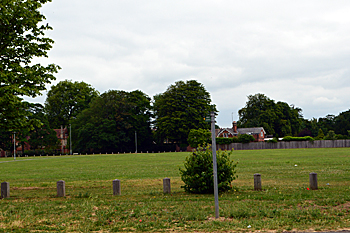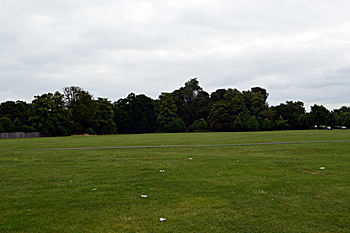Medieval Sudden Death in Goldington

Goldington Green from the south June 2017
Volume 41 produced by Bedfordshire Historical Records Society in 1961 is devoted to 13th and 14th century coroner's rolls for Bedfordshire from the National Archives, edited and translated by R. F. Hunnisett. Not all the accounts are of murder or violence, as witness this tragedy: “On 19th August 1267 Alice daughter of Henry Wigein of Goldington, aged almost two, went out of Henry’s court-yard to a well on Goldington Green, fell into it and drowned by misadventure. Her mother Agnes first found her and found pledges, Henry Wigein and Walter of Roxton of Goldington. Inquest before Simon the Red, coroner, by Goldington, Renhold, Great Barford and Wilden as above”. Alice, the mother, did not attend the next eyre and so her pledges were amerced. Nobody was suspected.

Goldington Green from the west June 2017
Another case shows sheer thoughtlessness and bad luck: “About prime on 14th June 1272 Maud daughter of Reynold the Smith of Goldington was sitting at her mother Eleanor’s doors on Goldington Green, when Alfred son of Gode of Salph End came, carrying a bow and arrows. He shot at a target with a small arrow and by misadventure struck Maud in the right eye so that she lost its sight. She died fifteen days later because she was weak and ill because pregnant. Inquest before the same coroner [Ralph of Goldington], by Goldington, Great Barford, Renhold and Ravensden as one township and Wilden, who said that she did not die of the wound but of another illness because she was pregnant. Nevertheless the king’s bailiff was ordered to attach Alfred”. At the following eyre it was said that Maud was struck under the eye. It was ordered that Alfred, who had immediately fled and was suspected, be exacted and outlawed. He had no chattels, but was in the mainpast of the abbot of Old Warden, who was amerced for not producing him.